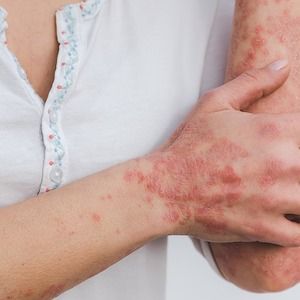Article
Baricitinib Effective in Atopic Dermatitis Patients who Failed Dupilumab
Author(s):
The treatment resulted in significant improvements in the Eczema Area and Severity Index (EASI) scores and patient-reported outcome measure scores.

New research shows baricitinib could be an effective treatment option for patients with atopic dermatitis who do not respond to dupilumab.
A team, led by Linde de Wijs, Department of Dermatology, Erasmus MC University Medical Center, evaluated the effectiveness and safety of baricitinib treatment in daily practice for patients with atopic dermatitis who have inadequately responded to dupilumab.
Baricitinib
Baricitinib represents the first ever small molecule Janus kinase (JAK) inhibitors approved for the treatment of moderate-to-severe atopic dermatitis.
However, there is not much data on the efficacy and safety of daily practice for patients treated with baricitinib, representing a need for new observational studies conducted in clinical care.
“It is known that effectiveness (daily practice) might differ from efficacy (clinical trials),” the authors wrote. “This may partially be caused by stringent inclusion and exclusion criteria in clinical trials, such as exclusion of patients who previously have been treated with dupilumab.”
The Patients
In the prospective observational cohort study, the investigators identified patients with atopic dermatitis who failed dupilumab treatment and started baricitinib treatment in the context of standard care at the Erasmus MC between December 2020 and June 2021.
Each patient was treated with 4 mg baricitinib once daily and visited the outpatient clinic at the start of treatment and after 4 and 12 weeks.
The investigators analyzed physician-reported scores and patient-reported outcome measure scores.
Overall, the study included 25 patients with a median age of 29. Most patients (84%) were previously treated with at least 2 immunosupprievise therapies, including cyclosporine A (96%) and (short term) systemic corticosteroids (68%). Each patient was previously treated with dupilumab for a median duration of 7 months.
Of the patient population, 18 consulted the department at 12 weeks and 4 patients discontinued baricitinib before 12 weeks of treatment and 3 were still in follow-up.
The treatment resulted in significant improvements in the Eczema Area and Severity Index (EASI) scores and patient-reported outcome measure scores. Here, 7 patients showed a good and sustained response, while 8 patients showed no response and 5 patients show an initial response but worsened EASI scores over time. In addition, 4 patients discontinued baricitinib treatment because of ineffectiveness or side effects.
EASI scores significantly decreased from baseline (median 12.8) to Week 4 (median 6.2) (P = 0.003), but while there was a significant decrease from baseline to Week 12 (median 9.6) (P = 0.006), median EASI scores increased between Weeks 4-12.
“Baricitinib can be an effective treatment for a subset of AD patients who failed dupilumab treatment in daily practice,” the authors wrote. “We found three different treatment response groups including responders, temporarily responders, and non-responders.”
The study, “Baricitinib for atopic dermatitis patients who responded inadequately to dupilumab treatment: First daily practice results,” was published online in JEADV.





